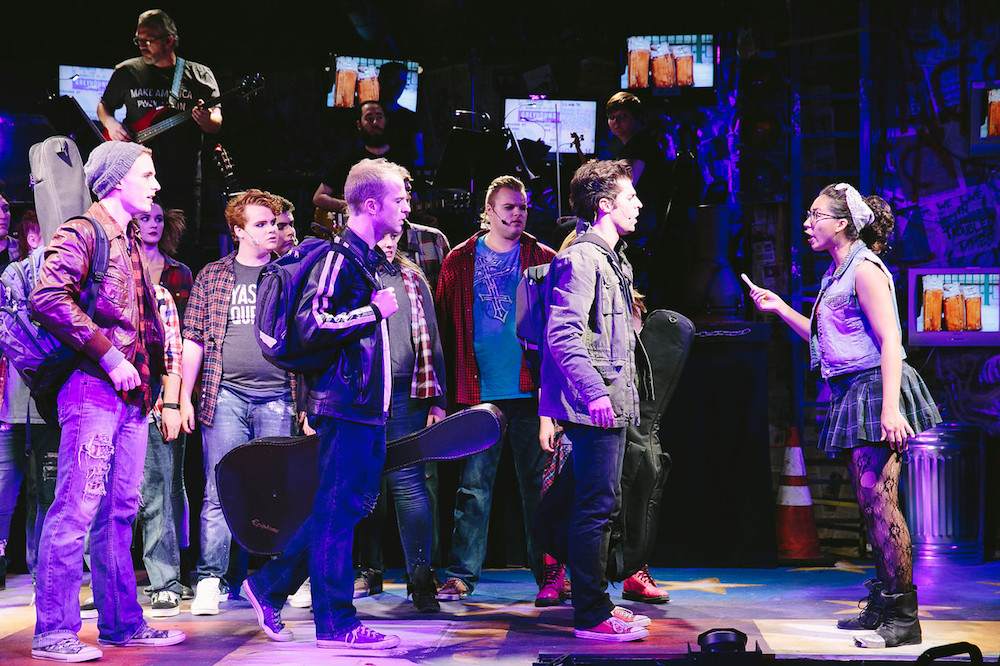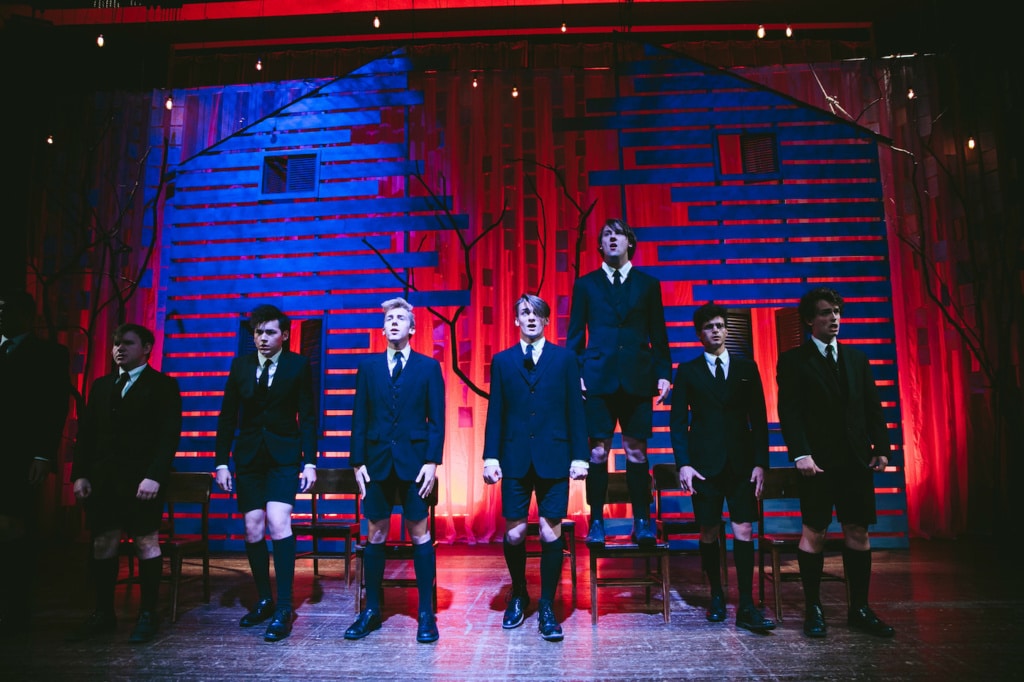Two productions featuring coming-of-age characters are now running in Central New York. Syracuse Summer Theatre is presenting the controversial 1890s story Spring Awakening, which was reworked and reintroduced as a rock musical in 2006, at the Mulroy Civic Center’s Bevard Room, 411 Montgomery St., through Sunday, Aug. 6. (Call (315) 435-2121 or visit syracusesummertheatre.com for details.) And Central New York Playhouse hosts the area premiere of Green Day’s rock opera American Idiot through Saturday, Aug. 5, at its Shoppingtown Mall venue, 3649 Erie Blvd. E. (Call (315) 885-8960 or visit cnyplayhouse.org.)

Despite being over a century apart, the two stories show few differences when it comes to sexual awareness, drugs, the desire to fit in and what it means to be a teenager. It’s easy to change the topic or avoid discussion about provocative issues, but there is an equal push that says conversation is necessary. Both productions contain moments of nudity, sexual content, drug use and violence.
Cast and crew members from both shows gathered for a discussion at the historic Barnes Hiscock Mansion, 930 James St. In alphabetical order: Maya Dwyer (Wendla, Spring Awakening), Liam Fitzpatrick (director, American Idiot), Mike Gibson (Johnny, American Idiot), Garrett Heater (director, Spring Awakening), Tyler Ianuzi (Will, American Idiot), Kaleigh Johnson (ensemble, Spring Awakening), Nicholas MacLane (Tunny, American Idiot), Carleena Manzi (ensemble, Spring Awakening), Bridget Moriarty (music director, Spring Awakening), Josh Taylor (St. Jimmy, American Idiot), Brendan Walker (ensemble, Spring Awakening), Hannah Weiler (Whatsername, American Idiot) and Morgan Williamson (Extraordinary Girl, American Idiot). (This panel discussion was moderated, edited and condensed by Christopher Malone.)
Could the directors give a synopsis of the productions?
Garrett Heater: In provincial Germany we have teenagers trying to understand their emerging sexuality (in Spring Awakening). They’re coming to terms with the strict mores of the social structure they are living in, the patriarchy and that they’re supposed to follow these rules. We see them make mistakes. Some don’t make it out of the show alive.
It’s a very entertaining way to reach our audiences with very important subjects that existed hundreds of years ago and still exist today. There are punk and rock elements to the music that helps filter the story though a very modern lens. The filter we use, especially with the prologue and epilogue, is to give the audience a sense of what the bigger picture is, what lies beyond this story from over 100 years ago.
The BeVard space, the way it’s being utilized, is very unique unto itself. Our production is true to the book, but everything we’ve put on it enhances it.
Liam Fitzpatrick: American Idiot was written post-9/11. Originally it was in 2004. We’ve updated it to 2017, so instead of writing postcards, the characters are texting. Rather than going to Afghanistan, the Marines are going to Syria. It’s about the disenfranchised youth in suburbia, coming of age before they’re really old enough to do anything with their lives. They’re kind of burnouts and kind of left behind, trying to get out. Two of them do, one doesn’t. It’s the next year of their life, figuring out how to get out of their situations on their own rather than blaming everyone else for it.
Because of the limitations of Central New York Playhouse being in Shoppingtown Mall, we had to build up and around what we have. (The original production’s) set had, like, six flights of stairs on both ends. We have a runway out into the audience for a more immersive experience, like a rock show. Sometimes these kids are right in your face.
Heater: As a company you have something valuable to say to your audience. And you want your fingerprint on it. Because these shows were chosen, it says a lot about how we feel they fit into society today. The subject matter rings true and its relevance.
Why should audiences be interested in checking out these productions?
Hannah Weiler: I think for American Idiot, especially incorporating Green Day’s music, it really reaches out to a broader spectrum of people who may not be interested in musicals. They have that appreciation for rock music. I grew up with Green Day and have been to a couple concerts. The album was written with the rock opera concept before it was even a musical. It’s great to see how the songs fit into the story and which character sings which song.
Mike Gibson: I wouldn’t be in this if it wasn’t a Green Day show. They’ve been my favorite band since I was 12. I come from the Syracuse music scene and have been in The Action! for many years. I couldn’t not audition for it.
When the album was written, it was during a very politically charged time. You may not pick up on the scathing review of Republican policy. Looking through that scope, the two standout political songs are the title track and “Holiday.” It’s become more relevant.
Fitzpatrick: Looking at this a year ago, I was thinking this was going to be a super-political show. It’s not. It’s about a generation and a community, these three guys and their friends and how they’re feeling. And this is why it’s so relatable to Spring Awakening.
Bridget Moriarty: Spring Awakening is scored for bass, drums, guitar and piano, but also violin, viola and cello. The strings and electric instruments become this beautiful blend of timbres and tonalities. There are songs where the strings don’t play, and songs where the electric instruments don’t play. It’s scored in a beautiful and specific manner.
The music does play into the characters. Moritz is always on the edge of exploding, and his music has a driving punk rock feel. Melchior, who is an intellectual, is accompanied by strong, melodic folk. When we learn about two of the female characters, who have been beaten and molested by their parents, there is a strong rhythm that utilizes both cello and guitar for a folk-punk rock feel.
This is a great opportunity for someone to sit in their chair and think they’re seeing this in the 1890s, but a lot of these issues are still going on today. The first line of the last number, “Purple Summer,” is “Listen to what’s in the heart of a child.” I take that to mean children and teens have something to say, and it’s up to us to listen.
Brendan Walker: For the parents of teenagers that are coming, and this sounds morbid, I would hope they would see their kids in these positions, so they don’t push their kids to be in those situations.
Carleena Manzi: There is always an educational element. It’s one of the biggest drives in theater: to have people leave a show and think about what they’ve seen. If they come in knowing it’s entertainment, it’s fine. But we want them to question why these themes are taboo and why people aren’t talking more about this.
Heater: The greatest compliment an artist can get is that people leave having been so impacted that they have something that stays with them for an infinite amount of time. We hope they see Spring Awakening, and they go out for a drink and they dissect the show. They unpack all the symbolism, the direction, the lighting choices and they share the information with someone else. All of a sudden you have the core essence of the show, moving toward enlightenment and this utopian plane.
Fitzpatrick: I think what’s beautiful about these shows is that they don’t have this big preachy number at the end. The stories are told and then they stop. It’s saying we’re not going to give you the answer, so you have to figure that out yourself.
Maya Dwyer: Audience members come in with their own set of life experiences, views and predisposed judgments about certain things. You’re forced to empathize with the characters on stage, whether you relate to them or not.
Nicholas MacLane: Theater allows us to become introspective. We can relate to the characters, but we also see pieces of ourselves. We might not be going through the same things they are, but you can take aspects and take them up a few notches. It may not be teenage pregnancy, but it’s dealing with the struggles of a relationship. It may even help knowing a character is going through something similar. I am not alone.
Kaleigh Johnson: I’ve never left a show without thinking about how I react to things, how I treat other people or things about life in general.
Josh, talk about your character St. Jimmy in American Idiot.
Josh Taylor: I’m a manifestation of Johnny’s (played by Gibson) addiction. I’m always present no matter what he’s doing. I’m the monkey on his back, grabbing and clawing at him.
Addiction is always there. The scenes where Johnny is trying to fight it are so powerful. I’m standing there with a smile on my face. This will make you better. It’s fine.
No matter what any of the characters are doing in the show, St. Jimmy is always there. It’s a fun role to play, but it’s terrifying because real people are dealing with it. There are so many people, including people I know, who are affected by addiction. Right now, especially in Central New York, there is an epidemic.

Can the characters and their vices help with conversation?
Dwyer: These shows give a refreshingly open and honest take on issues people don’t discuss. It’s important to have theater like this to push the boundaries to what is conventional or socially acceptable.
I think audience members get an opportunity to be affected or change their views on things. I think of (Vice President) Mike Pence going to see Hamilton. That caused a huge uproar, but he sat through it. No matter what his public and private views are, he was able to experience that journey and may see people differently.
Tyler Ianuzi: It opens up that discussion just by holding a mirror up to the audience. My character Will goes through depression the whole show. You may see someone in your life as a burnout or lazy. If you see it through Will’s perspective, you may see these qualities as a cry for help.
Manzi: Nothing is sugarcoated. It really invites people to talk about things afterward. Not talking about sexual abuse, teenage pregnancy or drug abuse could only create more negative outcomes.
MacLane: Regarding these taboos, there is a lot of shame associated with them. If they come out about being addicted to drugs, they could be fired from their job. I think the brilliance of these shows is that you see drug addiction, you see contemplation of suicide. The audience is also forced to confront these issues for what they are.
Moriarty: I like how modern theater is really making efforts to connect with audiences, not wrapping up with a fairytale ending. Even if a person isn’t comfortable talking about particular things, the doors are opening more.
In regard to bringing up these recurring themes, are they necessary or redundant?
Ianuzi: It’s definitely necessary, it’s forcing us to confront it. Some people think it’s not happening in their world, but it is. The arts help remind you that there’s more outside of your bubble.
Weiler: Problems follow you wherever you go. Unless you really confront it and get help, it’s going to stay. It’s the underlying message of both stories. In regard to the topic of suicide, the way it’s talked about in Spring Awakening and American Idiot, they speak to different people. There are no cookie-cutter problems.
There is a scene in Spring Awakening I really like that is relevant, especially to Planned Parenthood. In the beginning it’s asked where babies come from. The mom avoids the subject. To start off with this opens up a lot of possibilities.
Taylor: These shows are simply going to open up a dialogue. We want them to talk about how the singing and dancing were great, but the story and subjects are there.
Manzi: These issues are still relevant: 1890s Germany to 2017 America. We need to still talk about these issues. They’ll never get redundant.
Dwyer: Ideally, a production is done through a different lens. A director is bringing their own vision, their experiences and maybe a totally different concept than the original director. It’s why it’s interesting.
MacLane: A lot of the themes do resonate throughout history. We may act like it’s a new problem, but people were struggling with it for thousands of years. There may never be a resolution, but we’ll have to fight against them.
Why should people continue to check out the local theater scene?
Morgan Williamson: With every show I’ve seen and every show I’ve been in, every person in the cast and in the audience, whoever is experiencing the show, they’ll see the emotion being portrayed and will see it differently.
Manzi: The amount of talent that is put into everything. The actors. The set. The lighting design. The direction behind everything and production staff. A lot of people poured their heart and soul into these works. We have a short rehearsal process for most shows, and it’s a part-time thing for us. We do it because we love it. We’re not Broadway. Theater is an escape for me and a lot of people.
Ianuzi: If you attend shows often, you’ll see the same people attending different shows. Or you get to know people in the shows. You can meet a lot of cool people just by supporting that community.
Moriarty: The pit band that I utilize has four music educators in Central New York and down to the Binghamton area, plus a couple of college kids from Ithaca. There are so many different people from different backgrounds you can bring into a show.
Gibson: The amount of ambition that has gone into putting on American Idiot is astounding. It didn’t hit me until we were into rehearsals. It’s all come together, the set design and casting and a million costume changes. It’s super-impressive. And the music is unconventional; for those familiar with Rodgers and Hammerstein, there will be a lot of surprised people. People will be coming to see me in a show, and they have not been to a show in forever. I think they’ll be blown away.
As a Green Day fan, I had a fear I’d be sick of these songs by the end. That definitely has not happened.
Fitzpatrick: Both of these shows are activist shows. Even Bye, Bye, Birdie is about parents and kids not getting along. Even Oklahoma! is about a girl’s sexual awakening and having to choose between two guys.
The reason theater matters is because it’s people in the community looking at you in a safe space.
Taylor: It’s not just us. It’s almost impossible to see everything, because there is so much going on all the time.
Heater: I hope Central New York audiences embrace the opportunity to experience these shows. There is plenty to take away from both of them. At the end of the night, you’re being entertained while being engaged with the story.



